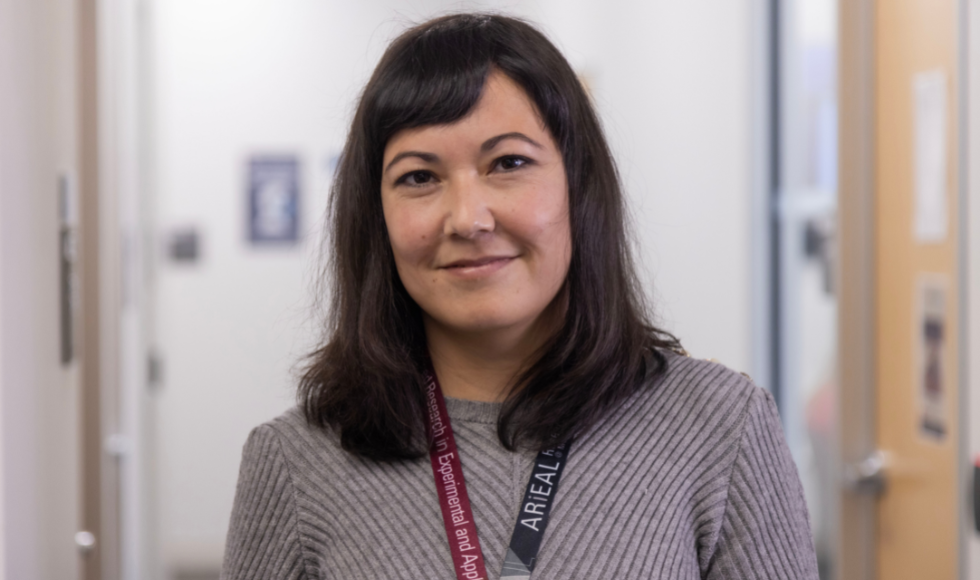Far from home, Ukrainian scholar works to keep her language alive

Ukrainian researcher Alina Dochu is working to reverse the decline of the Crimean Tatar language, which is in danger of dying out because of a Russian ban.
BY Sara Laux
December 9, 2022
More than 8,000 kilometres away from her family home in Crimea, linguist Alina Dochu often finds herself thinking about her grandmother’s quşaq, a highly ornamental traditional belt that is typically handed down through generations among the Crimean Tatar people.
It represents not only everything she left behind after fleeing the Russian invasion of Ukraine this year, but the important cultural legacy that she has carried with her to McMaster as a Crimean Tatar.
Here, Dochu has found a safe haven as a postdoctoral fellow, working to preserve her language and her culture from afar — thanks to efforts by McMaster’s Centre for Advanced Research in Experimental and Applied Linguistics (ARiEAL) to bring her and other displaced Ukrainian scholars to Canada.
“ARiEAL has always had an ethical responsibility to support scholars and students from emerging economies, so we had put together a visiting scholar program that was supposed to have been piloted in the summer of 2022,” explains ARiEAL director Ivona Kučerová, an associate professor in linguistics and languages, who worked with fellow linguistics professor Victor Kuperman to arrange support for displaced Ukrainian scholars and students at McMaster.
“When the war in Ukraine started in February, we decided to use the funds we had put aside and the infrastructure we had created for those short-term stays and get as many people to safety as we could.”
Along with Dochu, ARiEAL has welcomed three other Ukrainian scholars: Maiia Bulakh, a linguistics lecturer from Taras Shevchenko National University of Kyiv, Mariia Hryntus, a computational linguistics master’s student from Lviv Polytechnic National University, and Olga Dvorova, a linguistics doctoral student who, like Dochu, is an expert in the Crimean Tatar language.
Funding for the scholars has come from McMaster’s Students at Risk Bursary, the SSHRC Special Response Fund for Ukraine and the Mitacs Canada-Ukraine program.
‘It’s a personal cause for us’ — Learn more about ARiEAL’s work with Ukrainian scholars and students
Crimean Tatars are a Muslim indigenous group of the Crimean Peninsula who have faced centuries of annexation, starvation and forcible displacement, including a wholesale deportation of the entire population to central Asia in 1944.
While efforts have been made to maintain the Crimean Tatar culture across the group’s diaspora, decades of upheaval and a Soviet ban on the Crimean Tatar language have meant that, while elements of the culture survive, the language itself is now considered severely endangered.
“It was forbidden to speak and develop the language, and Crimean Tatars did not have access to literary works or newspapers,” Dochu explains.
“Only the older generation who were children or teens at the time of the deportation were able to speak and play in their native language. Younger generations have been educated in Russian-language schools, so the intergenerational transmission of the language has been severely restricted.”
Reversing that decline is the focus of Dochu’s work.
It’s work that, for the time being, she can’t do at home. When Russian forces invaded Ukraine in February, Dochu was working at the Potebnia Institute of Linguistics of the National Academy of Sciences of Ukraine in Kyiv, focusing on various initiatives to codify and revitalize the Crimean Tatar language and working with international indigenous language policies.
When the invasion started, Dochu and her family were forced to leave their home in the military town of Vasylkiv as it came under heavy attack.
After initially going to Moldova, Dochu came to McMaster as a postdoctoral fellow under Kučerová’s supervision. They are working on a Social Sciences and Humanities Research Council (SSHRC) Partnership Development Grant that aims to establish a transnational network for indigenous language revitalization, building connections with Indigenous nations to create community-based language programs.
“I’ve already started learning quite a bit about indigenous language policies from Alina,” explains Kučerová. “We’re now trying to figure out how to involve people from local Indigenous circles to see whether there’s a way of learning from these different approaches, and figuring out how to translate them to a local Canadian context.”
Unlike in Europe, where many languages enjoy legal protection through various agreements with the United Nations and European Union, Canada has no protective policies for languages other than English and French, which makes the revitalization and protection of Indigenous languages complicated.
“As well, we have very little information about the attitudes of local Indigenous communities in respect to language policies, and this work absolutely has to be driven by community needs,” says Kučerová.
“Part of Alina’s work is to learn more about what communities would like for themselves, then look at ways to make that happen.”
As the war in Ukraine continues, Dochu says she’s grateful for what she’s experienced in Canada.
“I would like to say my thanks to the ARiEAL research centre, to my supervisor, Ivona Kučerová, and to professor Victor Kuperman,” she says. “I would also like to thank the Canadian government, who has helped Ukraine in this terrible war. Thank you to the Canadian scientists who have helped Ukrainian scientists.
“I think one day the war will end, we’ll connect in peace, and the scientists can continue their work.”


